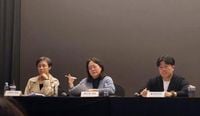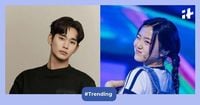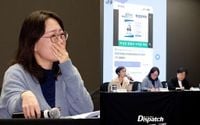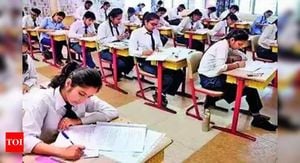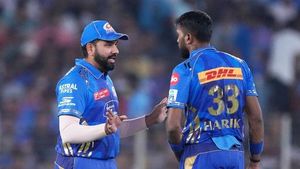The upcoming K-pop audition program "Under15," set to premiere on March 31, 2025, is under fire for featuring contestants as young as eight, prompting concerns over the sexualization and commodification of minors. Industry insiders say the controversy underscores a longstanding issue in the entertainment scene, highlighting the urgent need for improved public perception and the adoption of clearer guidelines on casting children and adolescents in nationally broadcast reality shows.
The survival show, which aims to form a new girl group with an average debut age of under 15, introduced 59 female participants in promotional materials released earlier this month. The contestants, all girls younger than 16, appeared wearing heavy makeup and styled in mature clothing, leading to a public outcry on social media over the portrayal of girls in a context some interpreted as inappropriate and exploitative.
Recruiting child idol hopefuls is nothing new in the K-pop industry. According to a local entertainment company official, most agencies set the upper age limit for new trainees at 15. "Nowadays, future K-pop stars begin training as early as age six. The oldest we usually accept as trainees is 15, unless the candidate is exceptionally talented — whether in singing, dancing or even just having standout visuals," the official said. "These days, elementary school graduation ceremonies have become one of the most popular places for casting trainees."
A poster released on March 12 drew particular criticism for using product label-like graphics to describe the girls with phrases such as "bright and bubbly" and "luxury and unique." Critics accused the show’s producers of treating children as marketable products, reinforcing harmful beauty standards and objectification at an early age. Lee Jong-im, a lecturer at Seoul National University of Science & Technology’s Graduate School of Public Policy and Information Technology, criticized the imagery and its implications. "The barcode-style graphic was a major problem. The production team said it was meant to resemble a student ID, but that explanation doesn’t make sense," Lee said. "The video shows the girls receiving makeup, and the close-up shots of their eyes could evoke a feeling of fetishization. It reflects a lack of thoughtful consideration during the promotion process."
Lee also pointed out the absence of proper safeguards when casting participants of such a young age, adding that producers seemed to emphasize youth over artistic direction or care. "There appears to have been no serious deliberation about how to shape the show’s creative direction. When it comes to participants under the age of 15, there should be better protection measures," she said. Citing international standards, Lee noted that the BBC, for example, prohibits its producers from following underage participants on social media and only allows contact through parents. "Such guidelines are necessary to protect children from unnecessary exposure and inappropriate relationships with producers," she added.
CReA Studio's CEO Hwang In Young shed tears while pleading for understanding over the 'UNDER15' controversy. She said there seems to be a misunderstanding about the show's vision and sought to clear up the accusation of child commodification. Even before its first broadcast, 'UNDER15' has faced public criticism. The show’s teaser alone sparked accusations of child sexualization. A production team representative stated, "Unforeseen suspicions have been exaggerated as if they were fact. This has deeply hurt not only us but also the contestants, mentors, trainers, and staff."
On March 25, 2025, the 'UNDER15' production team held an emergency press conference at the Grand Ballroom of Stanford Hotel Korea in Sangam, Mapo-gu, Seoul. Co-CEO Seo Hye Jin and co-CEO Hwang In Young, along with producer Yong Seok In, were present at the event. The production team opted for a bold approach, unveiling a condensed 25-minute version of the first episode. The footage featured performances from five of the 59 contestants. The condensed episode 1 preview showed a completely different vibe than the controversial teasers. The focus was on the contestants' aspirations and talents rather than provocative elements.
CEO Hwang explained, "Our first goal was to create an audition for the 'Alpha Generation.' In the K-pop industry, many under-15 talents are overlooked simply because of their age. We wanted to give them a chance." She continued, "When I worked on 'K-pop Star,' teenagers dominated the top spots, surprising the older generation. There are so many talented Alpha Generation kids, and we believe this show could open new doors for them."
Hwang addressed one major misconception about the show, clarifying that it was never originally intended to be a girl group audition or gender-restricted. She said, "It may have been an unfortunate decision, but we found that many exceptionally talented girls auditioned. We thought, 'Let’s start with a girl group, and if this works, we’ll do a boy group audition next.'" CEO Seo Hye Jin added, "Younger participants frequently seek auditions. Many ask where they should train or if they truly have talent." She said, "An audition isn’t a final destination. It’s just a gateway into the music industry. 'UNDER15' was always meant to be a development program where contestants receive K-pop training and grow as artists. Our show was designed with that in mind."
Producer Yong Seok In also explained that the judges' feedback in 'UNDER15' was adapted for younger contestants, prioritizing encouragement over harsh critiques, unlike other audition programs. Producer Yong emphasized, "This audition isn't just about debuting. It's about learning. We focused on what they could gain and take away from the experience." "There were many instances where they met with contestants offstage to offer guidance," he recalled.
The controversy began when 'UNDER15' released a teaser featuring young contestants in heavy makeup and revealing outfits, leading to calls for the show's cancellation. CEO Hwang explained, "We thought they looked great. We wanted to showcase a surprising contrast between what people expect of young contestants and their actual abilities." However, she admitted they later recognized the potential for misunderstanding. She said, "Because only certain images were being consumed, people misinterpreted it as a 'sexy concept.' That was never the intention. Once we realized the issue, we deleted the content. This has been a chance to reassess everything from the viewer’s perspective."
Another issue was the contestant profile images, which included barcode-like graphics beneath each participant’s photo, fueling further controversy. CEO Seo was especially frustrated by this accusation. She revealed private chat messages with the designer, explaining that the design was inspired by student ID cards. She explained, "We envisioned the audition as a school-like environment. It was shocking to see it reinterpreted in such a negative way. To protect the contestants, we’ve since taken down all profiles."
CEO Hwang added, "We removed the problematic images. The controversy escalated because of external factors, and in hindsight, we should have responded more proactively. That’s something we regret." Hwang reassured that both contestants and their parents were aware of the risks of reality TV but joined with hope. She said, "We maintained close communication with everyone involved, more so than any other audition show." At one point, she was visibly emotional when asked about the contestants’ reactions. "We’re not that kind of program, so why is it being portrayed this way?" she said, holding back tears. CEO Seo also struggled to continue speaking. She pleaded, "Would over 100 staff members really exploit young kids to create something predatory? Please believe in us." Producer Yong concluded, "I was truly amazed while directing. These kids own the stage with confidence. I hope viewers will also feel moved when they see them perform."
